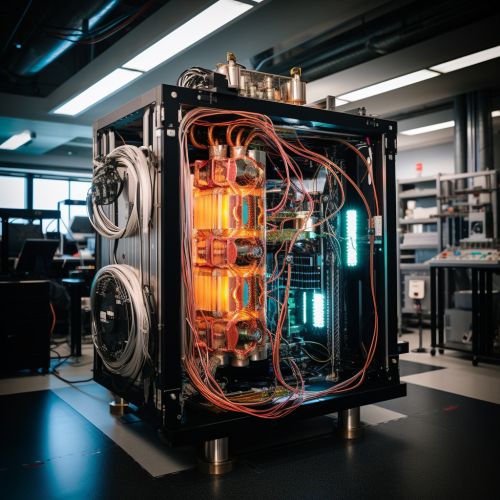Quantum Computing with Quantum Optomechanical Systems in Quantum Physics
Introduction
Quantum computing is a rapidly evolving field of study that leverages the principles of quantum mechanics to process information. Quantum optomechanical systems, a subfield of quantum physics, play a crucial role in the development of quantum computing technologies. This article delves into the intricate relationship between quantum computing and quantum optomechanical systems.
Quantum Computing
Quantum computing is a type of computation that utilizes quantum bits, or qubits, instead of the traditional binary bits used in classical computing. Qubits have the unique ability to exist in multiple states at once, a phenomenon known as superposition. This allows quantum computers to process a vast amount of data simultaneously, vastly outperforming classical computers for certain tasks.


Quantum Optomechanical Systems
Quantum optomechanical systems are physical systems that allow for the interaction between light (optical) and mechanical vibrations at the quantum level. These systems are often used to study quantum mechanical phenomena and have potential applications in quantum information processing and quantum computing.
Quantum Computing with Quantum Optomechanical Systems
Quantum optomechanical systems can be used to implement quantum computing in various ways. One of the main applications is in the creation of quantum gates, the basic building blocks of a quantum computer. Quantum gates operate on qubits, changing their state in a way that is fundamentally different from classical logic gates.
Another application of quantum optomechanical systems in quantum computing is in quantum error correction. Quantum error correction is essential for the practical implementation of quantum computers, as it allows for the correction of errors that inevitably occur due to the fragile nature of quantum states.
Quantum Physics and Quantum Computing
Quantum physics, the theory that describes the behavior of particles at the quantum level, is the foundation of quantum computing. Quantum physics allows for phenomena such as superposition and entanglement, which are fundamental to the operation of quantum computers.
Challenges and Future Directions
Despite the significant potential of quantum computing with quantum optomechanical systems, there are several challenges that need to be addressed. These include the need for better control over quantum states, the development of more efficient quantum algorithms, and the need for scalable quantum computing architectures.
The future of quantum computing with quantum optomechanical systems is promising, with ongoing research focusing on overcoming these challenges. With continued advancements, quantum computing has the potential to revolutionize various fields, including cryptography, optimization, and drug discovery.
